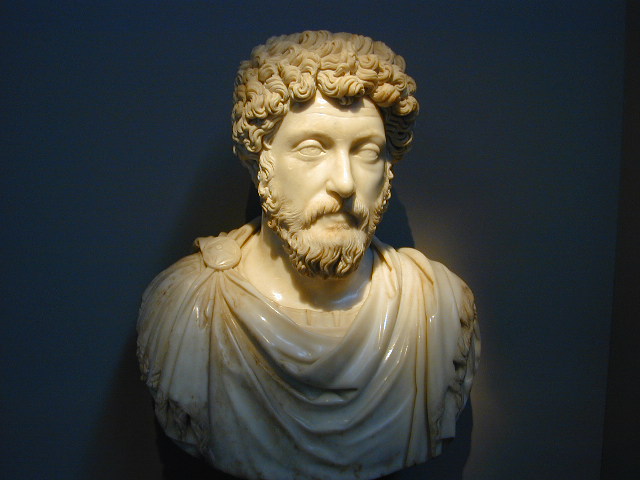
April 21, 2011

Marcus Aurelius
How fair a rule is monarchy? A Byzantine scholar wrote that it was the fairest, to the point that God sustained it, as long as the emperors were elected by the army or an aristocratic senate. With their coronation, legitimate successors and usurpers alike automatically became sacred. The ancient Greeks had gone a step further. They did not require a Godlike sustenance or perfection from their kings, only greatness. Agamemnon, Menelaos, Odysseus, Achilles, and Leonidas were all great kings but not perfect human beings. Practical Romans distrusted Greek morality about kings and heroes, and in Marcus Aurelius they produced the supreme type of philosopher king of whom Plato had merely dreamed. Marcus wrote in his Meditations, “One should rule in accordance with reason, in obedience to Providence, in the service of his subjects.” (Just like the self-appointed King of Kings, the scumbag Gaddafi.) Poor old Marcus: His reign was one disaster after another. Treason, a terrible plague, war, and bankruptcy. He sacrificed his own life to preserve his subjects’ vain life. So much for good intentions.
The modern world has put water in its wine—an old Greek expression—and kings and queens nowadays are mostly constitutional monarchs, except in joke countries such as Saudi Arabia, Bahrain, Kuwait, and the rest of the tiny kleptocracies with black gold gushing underneath.
Late in life I became convinced that a bad constitutional monarch is nevertheless superior to a good president. Modern politics have poisoned our system to such an extent that only an unelected monarch can succeed in uniting the people. Look at Japan and how the emperor managed to keep a twice-nuked country suffering terrible losses after the war from turning into a Somalia. Sure, the Japanese people are homogeneous, hard-working, and extremely disciplined. They don’t have multicultural busybodies stirring the pot. But if the American Caesar had not sustained the Mikado in his position, I am not so sure Japan would have become the world’s second largest economy as quickly as it did.
Then look at my country, the joke of Europe, as president after president looked the other way while the very people who had put him there stole the country blind. Greece was a thriving country when the monarchy was abolished in a referendum where the king was not permitted equal time. In fact, he watched the results from London. Ditto Italy, an ungovernable nation which only a monarch could unite, but the last one abdicated after losing an allegedly fraud-tainted constitutional referendum in 1946. (And the communists were determined to call for civil disobedience if he had remained. Real good democrats, dem folk.)
Germany’s case is strange. It’s Europe’s richest and most successful country, although its army is ridiculous. I am certain that had the Kaiser not been forced to abdicate, Hitler would never have become chancellor. By October 1918, after the Ludendorff Offensive had collapsed under Allied counterattacks, Turkey, Austria, and Bulgaria had given up, and by November 3, the Imperial Navy had mutinied at Kiel. The Kaiser abdicated six days later. With the swift collapse of central authority, revolutionary sentiments spread from Bolshevik Russia to Germany. But Germany’s renewal had to come from the right rather than the left, especially after 1919’s Spartacist revolt. A Kaiser could have managed the middle way. But I digress.